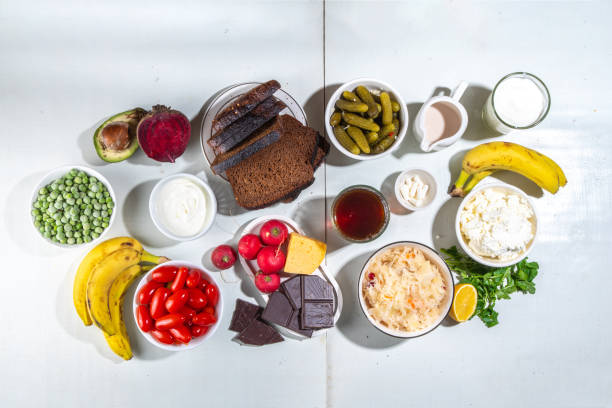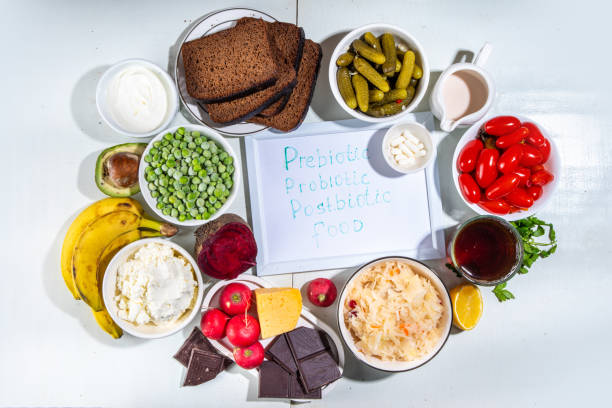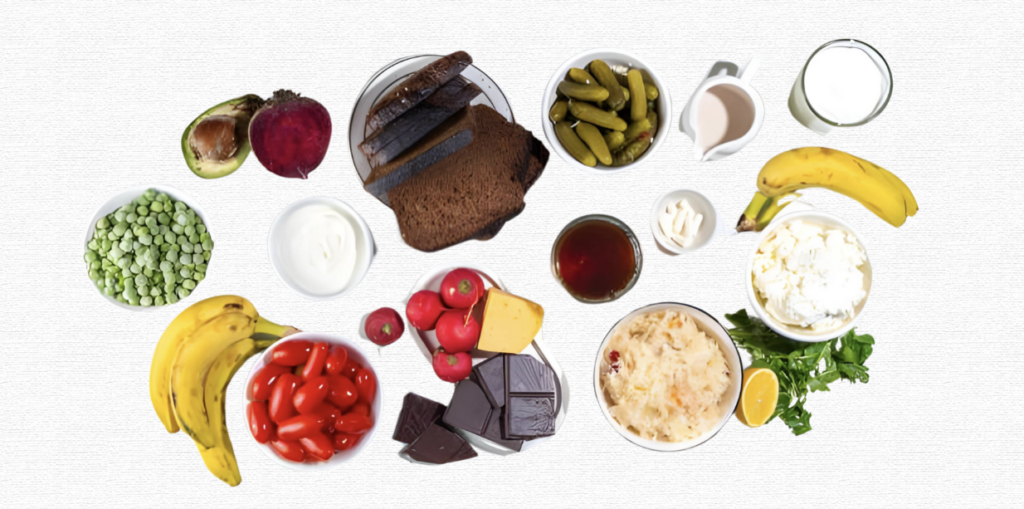Nutrition
Is It Good to Take Prebiotics and Postbiotics Together?
Prebiotics and postbiotics are essential for preserving intestinal health, to understand how they work together, first let’s define them.
Prebiotics are non-digestible fibers that nourish the healthy microorganisms in your stomach. They are commonly found in specific carbohydrates, including fructans and galacto-oligosaccharides (GOS). When you take prebiotics, they pass through the upper part of your gastrointestinal tract undigested. When they reach your colon, they provide fuel for the beneficial bacteria that live there.
In contrast, postbiotics are byproducts of the fermentation process carried out by these beneficial bacteria. When beneficial bacteria break down prebiotic fibers, they generate a variety of molecules, including short-chain fatty acids (SCFAs), vitamins, enzymes, and antibacterial substances. These substances are collectively referred to as postbiotics.
Prebiotics and postbiotics are good for gut health.
Both prebiotics and postbiotics provide a variety of benefits for gut health. Let’s look at some of these advantages in greater detail.
Prebiotics encourage the growth of healthy bacteria in your stomach, including Bifidobacteria and Lactobacilli. Prebiotics assist maintain a healthy balance of gut flora by providing a source of fuel for these bacteria. This, in turn, can improve digestion, increase nutrient absorption, and promote overall gut health.
Furthermore, prebiotics have been demonstrated to improve a variety of health outcomes. They can help balance blood sugar levels, manage weight, and boost immunological function. Some research suggests that prebiotics may play a role in lowering the risk of some chronic diseases, such as cardiovascular disease and colorectal cancer.
In contrast, postbiotics provide their own set of benefits. One of the important postbiotics, SCFAs, has been demonstrated to have anti-inflammatory effects. They lower gut inflammation, which can be beneficial for people suffering from inflammatory bowel disease (IBD). SCFAs also help to maintain the intestinal barrier, which keeps dangerous compounds out of the bloodstream.
In addition to SCFAs, postbiotics contain additional molecules with antibacterial, antioxidant, and immune-modulatory properties. These substances can boost the immune system, guard against infections, and improve overall gut health.

The difference between prebiotics and postbiotics
While prebiotics and postbiotics are closely connected, it is critical to grasp the primary distinctions between the two.
- Prebiotics: Prebiotics are fibers that nourish your gut’s healthy bacteria. They are not digested by your body, but rather act as a food supply for bacteria. Inulin, oligofructose, and resistant starch are examples of prebiotics. These fibers occur naturally in foods such as onions, garlic, bananas, and whole grains. Prebiotic fibers can also be received from supplements.
- Postbiotics: In contrast, postbiotics are substances created by helpful bacteria during fermentation. They are the byproduct of the degradation of prebiotic fiber. Postbiotics include short-chain fatty acids (SCFAs) like acetate, propionate, and butyrate, as well as other bacteria-produced metabolites and compounds. Postbiotics are not found in food directly, but are created in your stomach when bacteria digest prebiotics.
Prebiotics and postbiotics don’t have to coexist. Prebiotics fuel the helpful bacteria that create postbiotics. In this way, they act together to promote gut health.
How prebiotics and postbiotics work together to support a healthy gut
Prebiotics and postbiotics operate together in a symbiotic partnership to keep the gut healthy. Prebiotics serve as a fuel for beneficial bacteria, allowing them to grow and multiply. When bacteria break down prebiotic fibers, they form postbiotics, which have extra advantages for the gut.
Prebiotics are the primary source of energy for the good bacteria in your gut. When you consume prebiotic-rich meals or supplements, the fibers travel through the upper part of your digestive tract without being digested. Once in your colon, bacteria ferment the fibers and transform them into a variety of chemicals, including SCFAs, vitamins, and enzymes.
SCFAs created during the fermentation process are important for gut health. They supply energy to the cells that line your colon, aid in the absorption of minerals such as calcium and magnesium, and help regulate the pH balance in your gut. SCFAs also have anti-inflammatory characteristics and can help maintain the intestinal barrier, preventing dangerous chemicals from entering the bloodstream.
In addition to SCFAs, the bacteria produce various postbiotics with their own distinct effects. These postbiotics can influence the immune system, limit the growth of dangerous bacteria, and boost antioxidant levels. Together, prebiotics and postbiotics foster the growth of beneficial bacteria and boost overall gut health.

Foods that are rich in prebiotics and postbiotics
To improve your gut health, consider foods high in prebiotics and postbiotics in your diet. Here are some examples of meals that contain these useful compounds:
Prebiotic-rich foods:
- Onions and garlic: These vegetables are rich in inulin and fructooligosaccharides (FOS), both of which are prebiotic fibers.
- Bananas: Ripe bananas are a great source of resistant starch, a type of prebiotic fiber that feeds beneficial bacteria.
- Chicory root: This root vegetable is one of the richest sources of inulin, making it an excellent prebiotic.
- Jerusalem artichokes: These tubers contain inulin and FOS, providing a double dose of prebiotic fibers.
- Whole grains: Foods like oats, barley, and wheat are rich in soluble fibers that act as prebiotics.
Postbiotic-rich foods:
- Fermented foods: Foods like yogurt, kefir, sauerkraut, and kimchi contain live cultures of beneficial bacteria that produce postbiotics during fermentation.
- Miso and tempeh: These fermented soybean products are rich in probiotics and postbiotics.
- Apple cider vinegar: Made from fermented apples, apple cider vinegar contains beneficial bacteria and postbiotics.
- Kombucha: This fermented tea is packed with probiotics and postbiotics, making it a great choice for gut health.
By integrating these prebiotics and postbiotics food together into your diet, you can give your gut with the required prebiotics while also promoting the synthesis of postbiotics by beneficial bacteria.
Prebiotic and postbiotic supplements – how to choose the right one
If your diet does not provide enough prebiotics and postbiotics, supplements can be a practical solution. However, selecting the correct supplement is critical to ensuring you get the maximum benefit.
When choosing a prebiotic supplement, opt for one that has a variety of prebiotic fibers, including inulin, oligofructose, and resistant starch. These fibers have been extensively investigated and found to have a good influence on gut health. It’s also critical to double-check the dosage and adhere to the manufacturer’s recommendations.
Postbiotic supplements are less frequent than prebiotic and probiotic supplements. However, several companies have begun to create postbiotic-specific products. These supplements usually include postbiotics in the form of concentrated SCFAs or other metabolites. When selecting a postbiotic supplement, search for one that has been evaluated for quality and effectiveness.
It’s always a good idea to talk to a doctor before starting any new supplements, especially if you have any underlying health issues or are using drugs. They can make individualized recommendations based on your specific needs and assist you in selecting the appropriate prebiotics and postbiotics for your gut health.

Potential side effects of taking prebiotics and postbiotics together
While prebiotics and postbiotics are typically safe for the majority of people, taking them together may cause negative effects. These adverse effects are often modest and short-lived, but they should be noted.
Consuming prebiotics can cause digestive discomfort such as bloating, gas, and diarrhea. This is because the bacteria in your gut process the prebiotic fibers, producing gas as a byproduct. If you have these symptoms, it may be beneficial to begin with a low dose of prebiotics and gradually increase it as your gut adjusts.
Similarly, taking high doses of postbiotics, such as concentrated SCFAs, might create stomach issues. To avoid pain, start with a low dose and gradually increase it.
If you have a medical problem or are on drugs, you should see a doctor before incorporating prebiotics and postbiotics into your daily routine. They can provide you personalized advice and assist you assess whether there are any potential interactions or contraindications.
Prebiotics, postbiotics, and their impact on overall health and wellbeing
While prebiotics and postbiotics are well known for aiding gut health, their effects go beyond the digestive system. According to research, a healthy gut microbiota is linked to many aspects of overall health and well-being.
- Immune function: The gut microbiome plays a crucial role in supporting a healthy immune system. By promoting the growth of beneficial bacteria and producing SCFAs, prebiotics and postbiotics can help strengthen immune function and protect against infections.
- Inflammation and chronic diseases: Chronic inflammation is linked to the development of various diseases, including cardiovascular disease, diabetes, and autoimmune disorders. Prebiotics and postbiotics have been shown to have anti-inflammatory effects, which can help reduce the risk of these chronic diseases.
- Mental health: The gut-brain axis is a bidirectional communication system between the gut and the brain. Emerging research suggests that a healthy gut microbiome, supported by prebiotics and postbiotics, may play a role in mental health conditions such as depression and anxiety.
- Weight management: Prebiotics and postbiotics can support healthy weight management by promoting the growth of beneficial bacteria associated with a leaner body composition. They may also help regulate appetite and reduce food cravings.
While more research is needed to fully understand the impact of prebiotics and postbiotics on these aspects of health, the current evidence suggests that they can play a significant role in promoting overall wellbeing.

Expert recommendations and guidelines for taking prebiotics and postbiotics together
When it comes to taking prebiotics and postbiotics together, there are no specific guidelines or recommendations that have been established. However, here are some general tips to consider:
- Start with small amounts: If you’re new to prebiotics and postbiotics, it’s advisable to start small and gradually increase your dosage. This permits your gut to become accustomed to the new fibers and metabolites.
- Listen to your body: Pay attention to how your body reacts to prebiotics and postbiotics. If you develop digestive discomfort or other side effects, adjust the dosage or visit a doctor.
- Combine with a healthy diet: Prebiotics and postbiotics should be considered as part of a holistic approach to gut health. To support a diverse gut flora, eat a well-balanced diet rich in fruits and vegetables, whole grains, and fermented foods.
- Consider timing: Some people benefit from taking prebiotics and postbiotics with meals, while others prefer to take them separately. Experiment with various timing tactics to determine what works best for you.
- Visit a healthcare provider: If you have any underlying health concerns or are taking drugs, you should visit a healthcare practitioner before incorporating prebiotics and postbiotics into your daily routine. They can make personalized recommendations and confirm that there are no contraindications.
Remember that everyone’s gut microbiota is unique, so what works for one person might not work for another. Finding the ideal ratio of prebiotics to postbiotics that works best for you may need some trial and error.
Conclusion
Finally, prebiotics and postbiotics are important in maintaining gut health and overall well-being. While there is limited data on whether consuming them together improves their effects, prebiotics and postbiotics are typically safe to eat together.
Prebiotics provide fuel to the beneficial bacteria in your gut, whereas postbiotics are substances created by these bacteria during fermentation. Together, they produce an environment that encourages the growth of beneficial bacteria, improves digestion, fortifies the immune system, and decreases inflammation.
To incorporate prebiotics and postbiotics into your regular diet, eat foods high in these compounds, such as onions, garlic, bananas, fermented foods, and whole grains. If you don’t get enough prebiotics and postbiotics from your diet, try taking supplements to help your gut health. Remember to start with tiny dosages, listen to your body, and get advice from a healthcare expert as needed.
Prioritizing gut health and including both prebiotics and postbiotics together into your daily routine will help to optimize your digestive system, strengthen your immune system, and improve your overall health and well-being.
Trusted Health, Wellness, and Medical advice for your well-being


